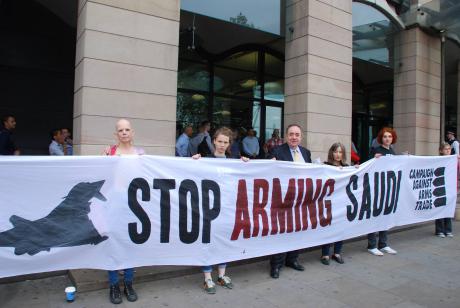Do we want a social Europe that invests in people and peace, or do we want one that focuses on arms, militarism and war?
By
This week the European Parliament will be debating the general EU budget for 2017/18. The main focus of the debate is likely to be the knock-on impacts of Brexit and the falling pound, infrastructure, migration and the many other major challenges facing the continent.
Understandably, a lot of significant items are likely to be overlooked, including a crucial point, that could see the EU taking steps towards adopting an institutional military-industrial strategy. Buried within the budget is the EU’s first proposed Preparatory Action for defence research.
If the budget is agreed, this would effectively be a trial-run that would see the European Parliament subsidising military research for the first time. It would represent an important precedent. At present, the European Commission finances exclusively civilian or dual-use R&D through its €80 billion Horizon 2020 programme.
The proposal, would cover the period of 2017-2020 at the estimated cost of €50-100 million – paving the way for a full research programme that the European Union Institute for Security Studies (EUISS), which made the proposal in the first place, estimates would cost at least €3.5 billion between 2021-2027.
Arms trade influence over decision making
Right from the start, the process has been influenced by those with a vested interest. The group that put the EUISS report together included high level representation from some of the biggest arms companies in the world. In fact, the majority of those on the Group of Personalities that the EUISS appointed to develop proposals are from the arms trade, so the pro-military conclusion is not particularly surprising.
In effect the arms industry has been brought in to advise the EU on military strategy and reached the conclusion that what is needed is more military spending.
Needless to say, arms companies already benefit from huge amount of public money. A lot of arms company R&D is already funded by member states. Supporters of the change have made clear that they do not foresee any parallel reduction of national budgets for military research, with manyn Member States still bound by their NATO commitments.
There is an international dimension to it too. The ADS, a trade body for arms companies, is clear about its motivations for supporting the proposal, which it says is focused on trying to “maintain and improve long-term competitiveness in the European Defence Industry.”
No explanation is provided for where the money would come from. Would it mean cutting 3.5bn EUR from other budgets? What would be cut in order to fund it? There is also very little explanation of how it will be spent or what checks-and-balances will be in place to stop it from becoming a blank-cheque for arms companies.
What kind of Europe do we want?
There is no question that security is a major challenge and that the EU has a critical role to play in addressing it. However, threats to security are multi-faceted and the solutions that the EU proposes to address them must be clearly based on the Treaties and core values of the EU.
The EU was envisaged as a peace project. The European Parliament stood up for those values this February, when it voted to support an arms embargo against Saudi Arabia due to its devastating bombardment of Yemen. Many of the weapons being used in the destruction are made in Europe, with many being manufactured by the same companies that would benefit from the proposed subsidy.
The EU should be investing in jobs and research projects that promote sustainable industries and contribute to the prevention of conflicts. This proposal could mean taking funds from other projects for something that would only benefit those that profit from war and conflict.
In a busy news agenda, the change may not be generating the headlines that the precedent deserves, but it is getting grass-roots opposition, with over 62,000 people having signed a European Network Against Arms Trade petition to oppose the spending.
Underpinning the opposition is the broader question of what kind of Europe we want. Do we want a social Europe that invests in people and peace, or do we want one that focuses on arms, militarism and war?
As UN Secretary General Ban Ki Moon has said ‘the World is over-armed and peace is under-funded.’ The EU could play a big role in changing this, but right now it risks doing the exact opposite.










